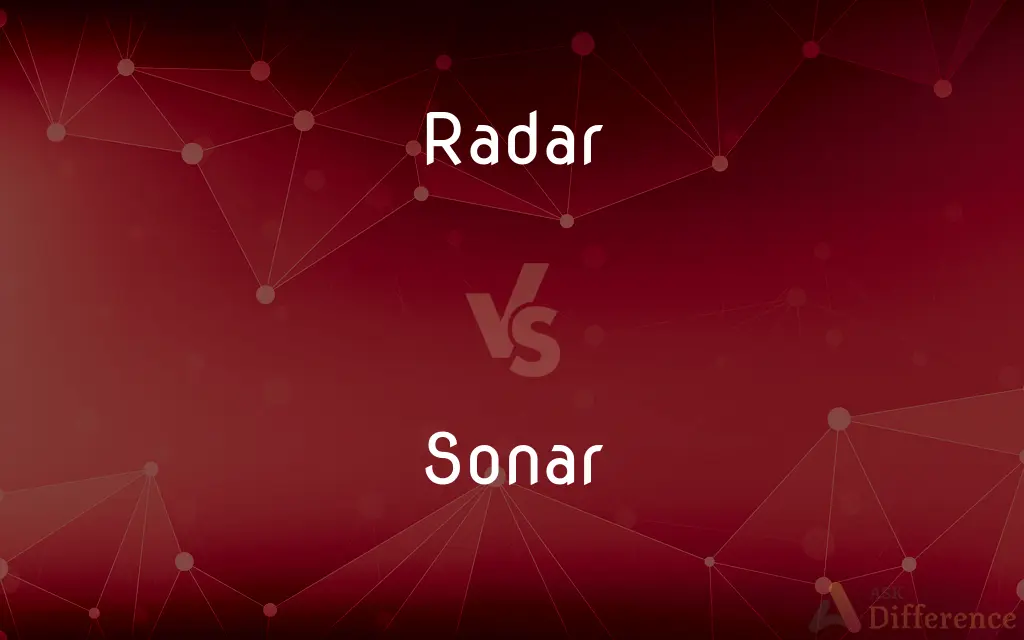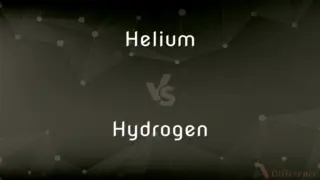Radar vs. Sonar — What's the Difference?
By Fiza Rafique & Urooj Arif — Updated on April 17, 2024
Radar uses radio waves to detect objects in the air, while sonar uses sound waves to locate objects underwater.

Difference Between Radar and Sonar
Table of Contents
ADVERTISEMENT
Key Differences
Radar emits radio waves and measures the reflection to detect objects' distance, direction, and speed. Sonar, on the other hand, employs sound waves for similar purposes but primarily underwater.
The effectiveness of radar is notable in air and space environments, where it aids in navigation and surveillance. Sonar excels in aquatic settings, crucial for submarine warfare, fishing, and underwater exploration.
Radar technology is vital for air traffic control, weather monitoring, and missile guidance. Conversely, sonar is essential in depth sounding, underwater communication, and detecting submerged objects.
Radar systems can operate in various conditions but struggle with obstacles like buildings or terrain. Sonar systems, while effective underwater, can be impeded by water density variations and seabed compositions.
The development of radar began before World War II, primarily for military applications. Sonar, initially developed during World War I, has evolved significantly to aid in both military and civilian maritime activities.
ADVERTISEMENT
Comparison Chart
Medium
Air, space
Water
Waves Used
Radio waves
Sound waves
Primary Use
Navigation, surveillance
Submarine warfare, exploration
Environmental Limitations
Less effective through solids
Affected by water composition
Development Era
Prior to World War II
During World War I
Compare with Definitions
Radar
A system for detecting the position, movement, and nature of a remote object using radio waves.
The airport's radar system quickly detected the incoming aircraft.
Sonar
A tool in marine archaeology for discovering shipwrecks and ancient ruins.
The exploration team used sonar to map the sea floor.
Radar
A method used in weather forecasting to observe precipitation.
The weather radar indicated a forming storm front.
Sonar
An apparatus used to emit and receive sound waves in water.
Fishermen use sonar technology to find schools of fish.
Radar
A mechanism in some animals, like bats, resembling radar functionality.
Bats use a natural radar to navigate and hunt in the dark.
Sonar
A method used by cetaceans like dolphins for echolocation.
Dolphins emit clicking sounds, using sonar to communicate and sense surroundings.
Radar
A device that automatically detects illegal or undesirable intrusions.
The radar caught the speeding car as it passed the sensor.
Sonar
Used metaphorically to denote detecting something or someone.
Her political sonar was tuned to pick up any changes in voter sentiment.
Radar
Figurative use to indicate keen awareness.
The issue was not on the manager’s radar until problems escalated.
Sonar
A technique that uses sound propagation under water to navigate or detect objects.
The submarine used sonar to locate the underwater mine.
Radar
Radar (Radio Detection and Ranging) is a detection system that uses radio waves to determine the distance (range), angle, or velocity of objects. It can be used to detect aircraft, ships, spacecraft, guided missiles, motor vehicles, weather formations, and terrain.
Sonar
Sonar (sound navigation and ranging) is a technique that uses sound propagation (usually underwater, as in submarine navigation) to navigate, communicate with or detect objects on or under the surface of the water, such as other vessels. Two types of technology share the name "sonar": passive sonar is essentially listening for the sound made by vessels; active sonar is emitting pulses of sounds and listening for echoes.
Radar
A method of detecting distant objects and determining their position, velocity, or other characteristics by analysis of very high frequency radio waves reflected from their surfaces.
Sonar
A system using transmitted and reflected underwater sound waves to detect and locate submerged objects or measure the distance to the floor of a body of water.
Radar
The equipment used in such detection.
Sonar
An apparatus, as one in a submarine, using sonar.
Radar
(uncountable) A method of detecting distant objects and determining their position, velocity, or other characteristics by analysis of sent radio waves (usually microwaves) reflected from their surfaces
The enemy fleet was able to be found using radar.
Sonar
Echolocation.
Radar
(countable) A type of system using such a method, differentiated by platform, configuration, frequency, power, and other technical attributes.
Sonar
(nautical) echolocation
Radar
(countable) An installation of such a system or of the transmitting and receiving apparatus.
Sonar
(nautical) A device that uses hydrophones (in the same manner as radar) to locate objects underwater.
Radar
A superior ability to detect something.
His sensitive radar for hidden alliances keeps him out of trouble.
Sonar
A measuring instrument that sends out an acoustic pulse in water and measures distances in terms of the time for the echo of the pulse to return; sonar is an acronym for sound navigation ranging; asdic is an acronym for anti-submarine detection investigation committee
Radar
To scan with radar, or as if with radar.
Radar
Measuring instrument in which the echo of a pulse of microwave radiation is used to detect and locate distant objects
Common Curiosities
Is radar affected by weather?
Yes, heavy rain or snow can degrade radar performance by scattering the radio waves.
Can radar be used underwater?
Radar is generally ineffective underwater due to the rapid attenuation of radio waves in water.
How does sonar work?
Sonar works by emitting sound waves and measuring their echo after reflecting off objects.
What is radar used for?
Radar is primarily used for detection, navigation, surveillance, and weather monitoring.
What are the limitations of sonar?
Sonar can be affected by water salinity, temperature layers, and obstructions on the seabed.
What role does radar play in modern warfare?
Radar is fundamental in modern warfare for early warning systems, missile guidance, and reconnaissance.
Are there any common applications where both radar and sonar are used?
Yes, in some advanced marine vessels, both technologies are used for comprehensive navigation and safety.
How accurate is radar compared to sonar?
Radar can cover larger distances with high accuracy, whereas sonar is more detailed for closer ranges.
What is the future of radar and sonar technology?
Both technologies are evolving with AI integration, enhancing capabilities for autonomous vehicles and drones.
Can animals use radar or sonar?
Animals like bats use a natural form of radar, while marine animals like dolphins use sonar for echolocation.
How critical is sonar for underwater exploration?
Sonar is crucial for underwater exploration, allowing detailed mapping of otherwise inaccessible areas.
How do radar and sonar contribute to safety?
Both technologies enhance safety by detecting potential hazards in their respective environments.
What advancements have been made in radar technology?
Recent advancements include phased array radars and synthetic aperture radar for improved imaging.
What advancements have been made in sonar technology?
Innovations include multibeam and side-scan sonar, which provide detailed images of the seafloor.
How does environmental conservation benefit from sonar?
Sonar helps in the tracking and study of marine life, aiding in the conservation of endangered species.
Share Your Discovery

Previous Comparison
Helium vs. Hydrogen
Next Comparison
Puma vs. LeopardAuthor Spotlight
Written by
Fiza RafiqueFiza Rafique is a skilled content writer at AskDifference.com, where she meticulously refines and enhances written pieces. Drawing from her vast editorial expertise, Fiza ensures clarity, accuracy, and precision in every article. Passionate about language, she continually seeks to elevate the quality of content for readers worldwide.
Co-written by
Urooj ArifUrooj is a skilled content writer at Ask Difference, known for her exceptional ability to simplify complex topics into engaging and informative content. With a passion for research and a flair for clear, concise writing, she consistently delivers articles that resonate with our diverse audience.















































